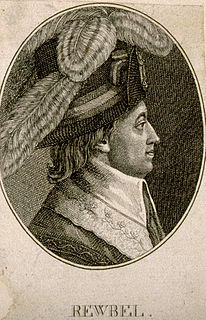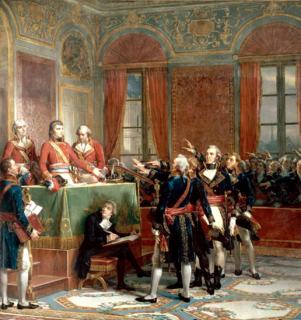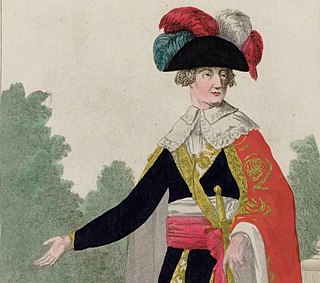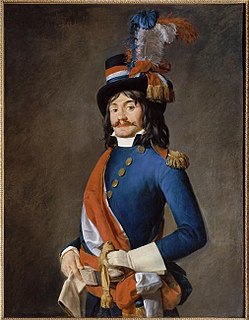
The French Revolution was a period of radical political and societal change in France that began with the Estates General of 1789 and ended with the formation of the French Consulate in November 1799. Many of its ideas are considered fundamental principles of liberal democracy, while phrases like Liberté, égalité, fraternité reappeared in other revolts, such as the 1917 Russian Revolution, and inspired campaigns for the abolition of slavery and universal suffrage. The values and institutions it created dominate French politics to this day.

The Directory was the governing five-member committee in the French First Republic from 2 November 1795 until 9 November 1799, when it was overthrown by Napoleon Bonaparte in the Coup of 18 Brumaire and replaced by the Consulate. Directoire is the name of the final four years of the French Revolution. Mainstream historiography also uses the term in reference to the period from the dissolution of the National Convention on 26 October 1795 to Napoleon's coup d’état.

Jean-François Reubell or Rewbell was a French lawyer, diplomat, and politician of the Revolution.

The following is a timeline of the French Revolution.

The National Convention was a parliament of the French Revolution, following the two-year National Constituent Assembly and the one-year Legislative Assembly. Created after the great insurrection of 10 August 1792, it was the first French government organized as a republic, abandoning the monarchy altogether. The Convention sat as a single-chamber assembly from 20 September 1792 to 26 October 1795.

The Consulate was the top-level Government of France from the fall of the Directory in the coup of 18 Brumaire on 10 November 1799 until the start of the Napoleonic Empire on 18 May 1804. By extension, the term The Consulate also refers to this period of French history.
This is a glossary of the French Revolution. It generally does not explicate names of individual people or their political associations; those can be found in List of people associated with the French Revolution.

The Coup of 18 Brumaire brought General Napoleon Bonaparte to power as First Consul of France and in the view of most historians ended the French Revolution. This bloodless coup d'état overthrew the Directory, replacing it with the French Consulate. This occurred on 9 November 1799, which was 18 Brumaire, Year VIII under the short-lived French Republican calendar system.

The Council of Five Hundred, or simply the Five Hundred, was the lower house of the legislature of France under the Constitution of the Year III. It existed during the period commonly known as the Directory (Directoire), from 26 October 1795 until 9 November 1799: roughly the second half of the period generally referred to as the French Revolution.

Jean-François-Auguste Moulin was a general of the French Revolution and member of the French Directory. He had a long career as a military officer serving France in the Royal Army of King Louis XVI, the Garde Nationale of the French Revolution, and the Grande Armée of Napoleon Bonaparte.
The Coup of 30 Prairial Year VII, also known as the Revenge of the Councils was a bloodless coup in France that occurred on 18 June 1799—30 Prairial Year VII by the French Republican Calendar. It left Emmanuel-Joseph Sieyès as the dominant figure of the French government, and prefigured the coup of 18 Brumaire that brought Napoleon Bonaparte to power.

The French Directory election of 1798 was held between 9 and 18 April 1798 and marked the beginning of the end of the French far-left and rise of the anti-mountain and anti-jacobin parties in France. The 1798 elections were partially invalidated by the passage of the Law of 22 Floréal Year VI which saw 106 members of the mountain lose their seats by decree of the Council of Five Hundred.

The French Director election of 1795 was held between 12 and 21 October 1795, which saw 1/3 of the directory elected according to the Constitution of the Year III. The election was the first election under the new Directory regime, and first election where the Thermidorians would win.

The White Terror was a period during the French Revolution in 1795 when a wave of violent attacks swept across much of France. The victims of this violence were people identified as being associated with the Reign of Terror – followers of Robespierre and Marat, and members of local Jacobin clubs. The violence was perpetrated primarily by those whose relatives or associates had been victims of the Great Terror, or whose lives and livelihoods had been threatened by the government and its supporters before the Thermidorean Reaction. Principally, these were, in Paris, the Muscadins, and in the countryside, monarchists, supporters of the Girondins, those who opposed the Civil Constitution of the Clergy and those otherwise hostile to the Jacobin political agenda.

The Coup of 18 Fructidor, Year V, was a seizure of power in France by members of the Directory, the government of the French First Republic, with support from the French military. The coup was provoked by the results of elections held months earlier, which had given the majority of seats in the country's Corps législatif to royalist candidates, threatening a restoration of the monarchy and a return to the ancien régime. Three of the five member of the Directory, Paul Barras, Jean-François Rewbell and Louis Marie de La Révellière-Lépeaux, with support of foreign minister Charles Maurice de Talleyrand-Périgord, staged the coup d'état that annulled many of the previous election's results and ousted the monarchists from the legislature.
The revolt of Lyon against the National Convention was a counter-revolutionary movement in the city of Lyon during the time of the French Revolution. It was a revolt of moderates against the more radical National Convention, the third government during the French Revolution. It broke out in June 1793 and was put down in October of the same year, after government forces had besieged the city.

Jean Bassal, 12 September 1752, Béziers – 3 May 1802, Paris, was a French Deputy, a Vincentian, and a revolutionary during the French Revolution. With other representatives on mission he sought to quell federalist impulses in the French provinces and to align the local Jacobin clubs with the Parisian model. As an aide to the famed Championnet he attempted the geographic and political reorganization of the Kingdom of Naples along republican lines.

Amédée Willot, Count of Gramprez, held several military commands during the French Revolutionary Wars but his association with Jean-Charles Pichegru led to his exile from France in 1797. He joined the French Royal Army as a volunteer in 1771 and was a captain by 1787. He was elected commander of a volunteer battalion in 1792 and served in the War of the Pyrenees. Shortly after being promoted commander of a light infantry regiment Willot was appointed general of brigade in June 1793. A few months later he was denounced as a Royalist and jailed. In the light of later events, this may have been an accurate assessment of Willot's sentiments. After release from prison in January 1795, he led troops in Spain during the summer campaign. He was promoted to general of division in July 1795.

The French Directory election of 1797 was held between 21 March and 2 April 1797 to elect a third of the Legislative Body of the Directory, that is to say 2/3 of the lower house, the Council of Five Hundred and the upper house, the Council of Ancients. The 1797 election marks the beginning of the 1/3 vote of its type. An election occurs each year with a third of the deputies up for election.


















